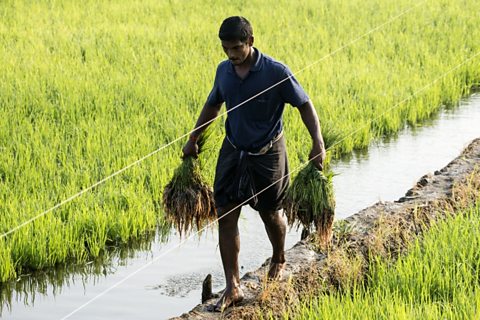Human activities and the greenhouse effect
Human activities are increasing the amount of some greenhouse gases in the atmosphere. For example:
- farming cattle releases methaneA colourless gas that can do harm to life forms.
- farming rice in paddy fieldsFields where rice is grown. releases methane
- burning fossil fuelNatural, finite fuel formed from the remains of living organisms, eg oil, coal and natural gas. in vehicles and power stationsA building that generates electricity. releases carbon dioxide
- deforestationThe cutting down of trees and forests to allow a different land use. releases carbon dioxide and reduces the absorption of carbon dioxide through photosynthesisA chemical process used by plants to make glucose and oxygen from carbon dioxide and water, using light energy. Oxygen is produced as a by-product of photosynthesis. Algae subsumed within plants and some bacteria are also photosynthetic.

Are humans causing climate change?
Not everyone in the world agrees that humans are causing global warmingThe rise in the average temperature of the Earth's surface. by causing the release of greenhouse gases into the atmosphere. Some people believe that the current and ongoing rise in global temperatures is being caused by natural factors and cycles of climate change.
However, the vast majority of scientists do believe that humans are responsible for the increase in greenhouse gases and therefore global warming. This is because the majority of evidence in peer reviewA process by which a scientific report is reviewed and checked for accuracy by other science experts before being published in a journal or on an official science website. journalA science magazine which normally specialises in a specific area of science and publishes research which has been done by scientists and checked (peer reviewed) by other scientists. supports the theory that human activities are causing an increase in greenhouse gases and this is causing global warming.
However, climate science is complicated and it is difficult to predict and explain what will happen to global temperatures in the future, so scientists cannot be certain about global warming.
The media (eg websites, TV news, newspapers) may sometimes present opinions and articles which are simplified, inaccurate, based on only some of the evidence or biased. It is important for new evidence to be shared with as many people as possible, so that other scientists can check the results and interpretation, and repeat the experiments for themselves.
When evaluating the quality of evidence on an issue like global warming, you should consider:
- who did the research and whether they are trustworthy, skilled and experienced
- who funded the research, because that might cause some bias
- what methods were used to collect and analyse the data, because that might cause uncertainties in the evidence base
- which organisation is reporting or publishing the evidence